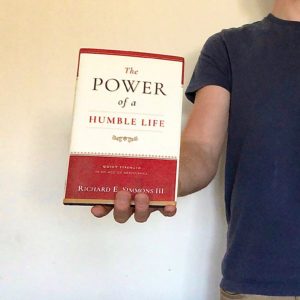 Life exists in balance. This is epitomized by ancient Chinese yin and yang philosophy. Day needs night, cold needs hot, silence needs noise, so on and so forth. In his book, Simmons puts the dichotomy between humility and arrogance under a microscope and the results are mostly unsurprising.
Life exists in balance. This is epitomized by ancient Chinese yin and yang philosophy. Day needs night, cold needs hot, silence needs noise, so on and so forth. In his book, Simmons puts the dichotomy between humility and arrogance under a microscope and the results are mostly unsurprising.
Anybody who lives in the modern western world is well aware of the impact of the internet and more specifically social media on our society. We have become a culture obsessed with image, and as a result the actual substance of our lives has decreased. Deeds are no longer done for altruistic reasons, but are rather performed for the recognition and approval of our “audience.” In his book, Simmons writes that “Many people are no longer concerned with lives of excellence. Instead, no matter how much a person accomplishes, he does not believe he is successful unless others know about it. We now regard success as achievement plus proper recognition of our achievement.” On this, I couldn’t agree more. You can see it happening ever more pervasively with younger generations as they become more and more transfixed with their social standing amongst their friend groups (and buried in their smartphones as a result.)
We live in a society that has been infected with pride for so long that it has become our lifeblood. Simmons writes: “If you go back 100 years, parents focused on their children’s character development. Today the emphasis is placed on their performance, and look at what it is doing to them. This is what pride can do to us and our families.” This emphasizes a mass cultural shift from a focus on what is internal to a focus on what is external. Bernie Madoff was a greedy crook who took people’s money because he was scared of being caught and branded a failure. Ames department stores followed a similar pattern. Whereas in the 70s and 80s they were comparable to Walmart, Ames expanded too quickly, overreached out of fear of failure, and eventually went bankrupt (twice.) The hubris of Ames corporate leaders lead directly to the company’s demise. Walmart, on the other hand, has grown slowly and successfully over time due to the patient and humble business strategies of its long time CEO Sam Walton. (Many of you may protest and point to Walmart’s destructive strategy of moving into rural areas and outcompeting local independent businesses. While this may be true, it doesn’t discount the fact that Walmart has continually expanded over 60+ years and has become the worlds largest company.)
This same analogy even extends to consumer products. Beats by Dre headphones aren’t a very good quality product—mine began buzzing in the left ear within the first month of owning them—when compared with longtime industry champions like Sony, Bose, Sennheiser, and Audio-Technica. As someone who has spent over a decade producing music, believe me when I say this. Yet why do Dr. Dre’s headphones continue to sell? Not because of the engineering on the inside, but because of the way it looks to people on the outside. Are Gucci and Versace actually better brands of clothing than Levi’s and Kirkland? Structurally probably not, but boy do people look at you more.
“Pride gets no pleasure out of having something, only out of having more than the next man” is a quote by the famed author C.S. Lewis, and this is where we have arrived. Teens don’t dance on Instagram and TikTok because they like dancing. They dance because it gets them more views than the next person. Larry Ellison, founder of Oracle, has a net worth of around 80 billion dollars. But is it enough? Of course not. His company is still playing second fiddle to Bill Gates and Microsoft. The fact that everybody has heard of Microsoft, and so many less of Oracle, tells you all you need to know.
What can be done about these troubling trends is an excellent question. In his book, Simmons suggests we turn towards faith, and for him that faith is in Christianity. He writes that “God provides a key perspective on the humble life when He says, ‘But you shall remember the Lord your God, for it is He who is giving you the power to make wealth…’” Seems contradictory to me. It’s like God is saying “Be humble, praise me!” Perhaps it is simply that I am not a believer. But I think Simmons is heading in the right direction, that direction being a focus on others and not the self. What he is grasping at is the idea of not allowing oneself to become the center of one’s own universe. Less me, more we. It shouldn’t matter if you have more than your neighbor. The question of most importance is, do we both have enough?
It is plain and obvious that the scale has tipped much too far in the direction of ego and we must right the ship. If we don’t lean back towards humility and even ourself out, we are destined to crash. Don’t take my word for it. Go ask Bernie Madoff.


